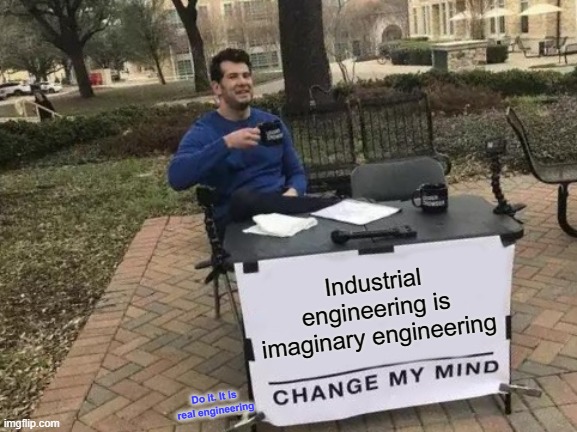Industrial Engineering is Imaginary Engineering.
No. It is Real Engineering. Industrial Engineering is Engineering Primarily.
___________
___________
In process charts, 5 operations are captured. Material or information processing, inspection by operators or specialist inspectors, material handling or transportation, storage, and delays (planning problems or issues). There are engineering inputs or elements in the first four operations. Industrial engineers have the responsibility to identify modified or new elements that can increase productivity as every day activity. For IEs every day is an opportunity to modify engineering elements and increase productivity in the organization and thereby reduce cost.
Cost reduction through productivity improvement by reducing material inputs or equipment time or time of operators does not impact quality. Industrial engineers specially check and make sure that quality of the output is not affected by IE modifications.
Product industrial engineering through value engineering or DFMA also calls for modifications to engineering elements.
Every day many accessories to accompany various types equipment in the organization are announced by suppliers. Industrial engineers have to keep track of them and assess their utility to increase productivity.
Industrial engineers are every day engineering change suggesters. They themselves have to come up with useful industrial engineering suggestions every day and invite every employee of the organization to contribute to the improvement of facilities, products and processes.
Machine Shop Engineering Developments and Cost Reduction News
2022 - 2021 - 2020 - 2019 - 2018 - 2017 - 2016 - 2015 - Up to 2014
Knowledge Base for Process Productivity Improvement - News - Information for
Industrial Engineering and "Real" Engineering - Prof. Buzacott
Engineers from the traditional engineering branches such as mechanical, civil, or electrical still argue that industrial engineering is not "real" engineering. Their argument is that industrial engineering programs usually do no more than pay lip service to the treatment of the engineering sciences, such as mechanics of materials, thermodynamics, or material science, which are central to most engineering programs. Further, licensing bodies evaluating the professional experience of applicants for professional engineering status have looked askance at industrial engineers whose experience has been restricted to the design and development of information systems. There is a widespread view that "real" engineering has to be concerned with "harnessing the forces of nature" and that it must be based on the traditional engineering sciences.
Some United States and European industrial engineering programs resolve this by including a substantial component on manufacturing methods. Yet the majority of North American industrial engineering programs follow the philosophy of the Roy report 121, and assert that, because of the diversity of the technologies industrial engineers encounter, such knowledge is best acquired on the job.
However, it would appear that the now universal use
of the systems viewpoint in other engineering branches
has tended to make it easier for industrial engineers to
claim that what they do is real engineering, particularly
when they emphasize their role in the design and synthesis of systems. The industrial engineer has no problem in
justifying his claim that he is practicing real engineering
when these systems contain significant components designed
by engineers from other branches. Nevertheless, one can
question whether industrial engineering curricula should
be influenced by the requirements of licensing bodies and
indeed whether there is much value to an industrial engineer
in seeking licensure.
Many industrial engineers find employment in hospitals and service organizations in functions remote from traditional engineering employment. It is a rare industrial engineer who is involved in design situations where there is a risk to human life or public safety. Thus many of the reasons for licensing do not seem to apply, and a reasonable proportion of graduate industrial engineers never seek licensure. Any attempt to restrict industrial engineering activity to those engineers who are licensed would be likely to be unsuccessful and would probably greatly restrict, rather than enhance, employment opportunities.
https://nudictionary.mmlc.northwestern.edu/wildwords/index.php/Imaginary_Engineers
Ud 29.6.2022
Pub 24.6.2022

292 hits during 7 pm to 3 am - first 8 hours
ReplyDelete600 hits in the first 24 hours. Interest still continues.
ReplyDelete